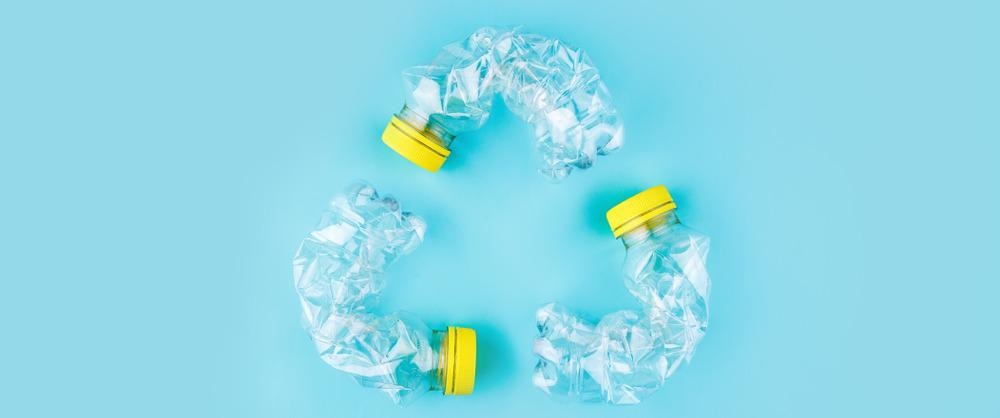AZoCleantech speaks to Professor Matthew Jones from the University of Bath about his team's innovative and plastic waste recycling that will make upcycling a more cost-effective technique. Jones describes his team's process and its importance in accelerating a circular economy worldwide.
Can you tell us briefly about your role at the University of Bath and how you began researching plastic waste upcycling?
I have worked at Bath University for 17 years, mainly focusing on new catalysts for sustainable chemical transformation.
I am a researcher and teacher, spending a lot of time with students. To be honest, we stumbled a little into the plastic waste upcycling area, one experiment did not do what we thought it would. Instead of making a polymer, we noticed that we completely degraded it. We quickly realized the importance of this result and have enjoyed working in this area for several years now.
Why is it important that we study how to upcycle plastic?
One of the major challenges associated with the chemical recycling of plastics is the need for the recycled product(s) to be cost-competitive with the virgin product(s), which are traditionally derived from cheap petrochemical feedstocks. However, by targeting value-added products from plastic waste via upcycling, we can provide economic incentives to the industry to adopt emerging renewable technologies. This will help to overcome inevitable barriers to adoption within the industry and thus accelerate the uptake of such technology.

Image Credit: Mykolastock/Shutterstock.com
What is the current extent of plastic waste in landfills and what effect does this have on our environment?
Plastic waste residing in either landfill or the natural environment currently outweighs all living biomass (4 Gtons), culminating in one of the great environmental challenges of the 21st century. Environmental consequences associated with this include pollution and chemical leakage, which can devastate ecosystems, notably in aquatic environments.
What are the current limitations of upcycling plastic waste?
This is system-dependent, but universal challenges in the field include energy intensity, waste production and cost.
Can you outline your study, including the methods taken and key findings?
Using a zinc-based catalyst and methanol, we completely broke down commercial poly(bisphenol A carbonate) (BPA-PC) beads within 20 minutes at room temperature. The waste can then be converted into its chemical constituents, namely bisphenol A (BPA) and dimethyl carbonate (DMC), helping to preserve product quality over an infinite number of cycles.
Our results were published in ChemSusChem, noting enhanced process efficiency and milder conditions compared to previous methods.
Promisingly, the catalyst is also tolerant to other commercial sources of BPA-PC (e.g. CD) and mixed waste feeds, increasing industrial relevance, whilst being amenable to other plastics (e.g. poly(lactic acid) (PLA) and poly(ethylene terephthalate) (PET)) at higher temperatures.
How will your research and new technique help make recycling plastic more economically viable? Why is this important?
Traditionally, the chemical recycling of polycarbonate is energy-intensive and costly. Our method creates new opportunities for polycarbonate recycling under mild conditions, helping to promote a circular economy approach and keep carbon in the loop indefinitely. This is imperative if we are to realize a truly sustainable and circular future.
How does your mild and rapid chemical recycling process break down commercial poly beads within 20 minutes at room temperature?
We effectively exploit a chemical transformation in the presence of methanol and a zinc-based catalyst to convert the plastic waste into its monomer constituents (BPA and DMC), which is reflected in the beads being broken down.
How is product quality preserved during the process and why is this important?
Following reaction completion, crude BPA is easily recoverable via the removal of the volatile components. Pure BPA can then be obtained by recrystallization from water followed by drying.
DMC should be easily recoverable via fractional distillation of the volatile components (this is necessary to separate it from the solvent, 2-Me-THF, which has a comparable boiling point). We expect both BPA and DMC to be of virgin quality, which is of critical importance for reuse.
How does the BPA recovery method prevent the leakage of a damaging environmental pollutant?
If BPA-PC waste were to escape into the natural environment, there is the potential for it to release BPA (one of its monomer units) as it slowly breaks down. BPA has been identified as a possible xenostrogenic pollutant and therefore waste strategies are required to manage it safely. By having a process to recycle BPA-PC, we can prevent leakage of such waste into the environment and thus release BPA.
How can the catalyst be used for other commercial sources of BPA-PC and mixed waste feeds?
This simply requires us to change the source of BPA-PC (e.g., use either beads or a CD) or the input feed (e.g., what we are putting into the reaction vessel). The fact we see comparable catalyst performance across all conditions suggests our catalyst is robust, which is important for industrial relevance.
What challenges has your team faced during your research and how have these been overcome?
One major challenge has been preparing catalysts that are industrially relevant, which relies on them being cheap and easy to prepare. To overcome this, we proactively seek simple solutions at each stage of catalyst development, employing chemistry that fits such criteria.
What are the next steps for the project?
Presently, the technology has only been demonstrated on a small scale. However, we are now working on catalyst optimization and scaling up the process.
Where can readers find more information?
Link to press release: https://www.bath.ac.uk/announcements/upcycling-plastic-waste-into-more-valuable-materials-could-make-recycling-pay-for-itself/
Link to paper: https://doi.org/10.1002/cssc.202200255
About Professor Matthew Jones
 I am currently a professor of inorganic Chemistry at Bath; this is a role that I love.
I am currently a professor of inorganic Chemistry at Bath; this is a role that I love.
I really enjoy the interaction of doctoral and undergraduate students. The sense of excitement on students’ faces when they “get chemistry” or make a new molecule never gets dull. I particularly enjoy the day we get a paper published or get some unexpected results from the lab.
Disclaimer: The views expressed here are those of the interviewee and do not necessarily represent the views of AZoM.com Limited (T/A) AZoNetwork, the owner and operator of this website. This disclaimer forms part of the Terms and Conditions of use of this website.